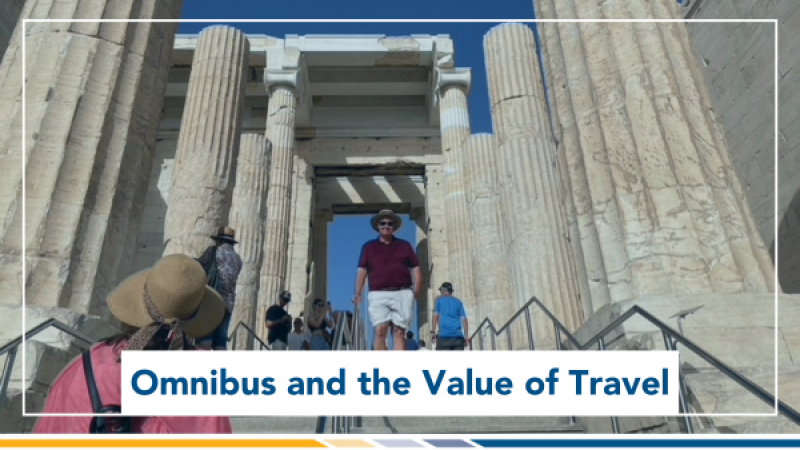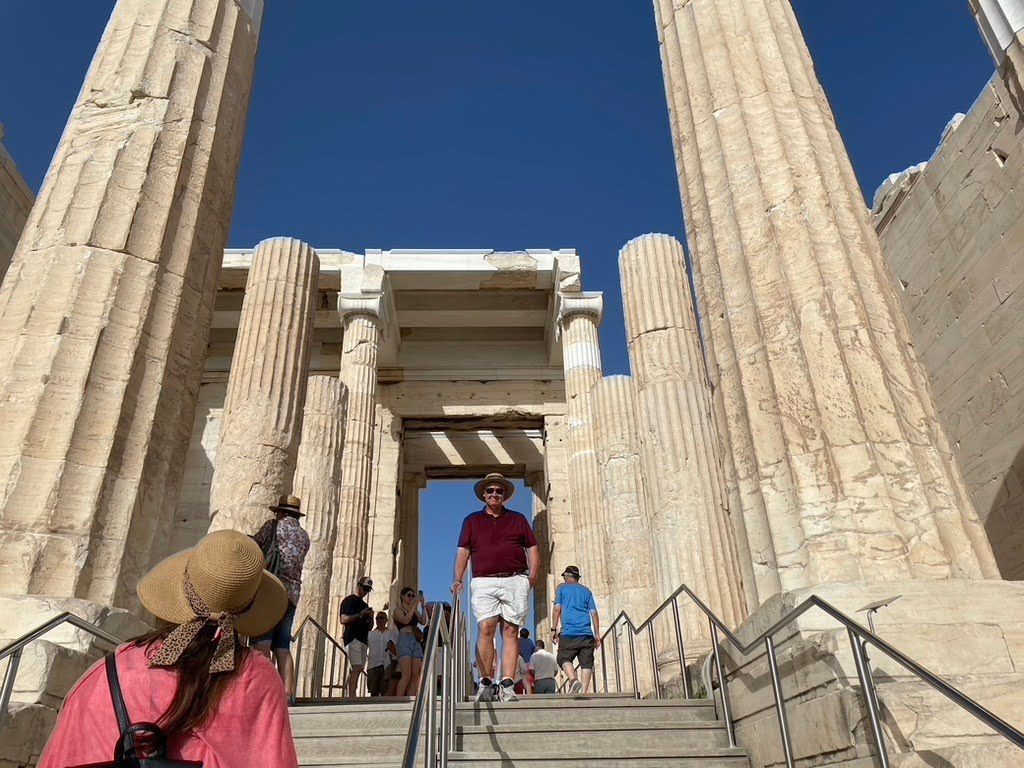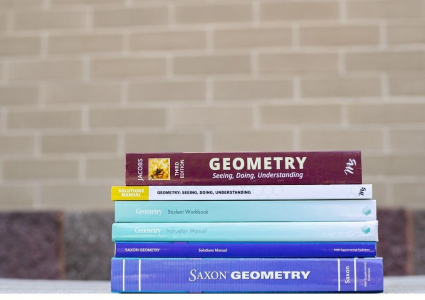Omnibus and the Value of Travel

The world is a book, and those who do not travel read only one page. - Augustine
Recently, my wife, Emily, and I went to Athens, Turkey, Santorini, and Crete. It was a blessing bestowed on us by some friends. Each morning, I wake up, read my Bible, record my blessings from yesterday, and pray through my prayers. On the front of my journal the quote from Augustine reminds me to travel. It was a blessing to smile at this quote each morning of our trip.

As we visited Hagia Sophia, Ephesus, The Parthenon, and the Palace at Knossos, the benefits and blessing that having studied Omnibus provides became more apparent.
Reason 1: The Preparation of the Omnibus Helps Students Get into the Weeds (and that is where the fun is!)
Here are a few examples from our trip:
The power and importance of the Roman Empire in its Western and Post-Constantinian Eastern manifestation comes to life when you travel.
Western Europe went from being a backward mess of constant tribal warfare to the dominant civilization. It was evident in our travels that one of the most important reasons for this flowering was the defense provided against invading Empires by the Byzantines (which would have thought themselves and been thought of as Romans).
The Hippodrome in Constantinople has an obelisk from Egypt and the famous Delphi Tripod that was with the Oracle at the navel of the world.

The Ottomans, who took over Constantinople in 1453, were gifted a fountain by the German Kaiser. It sits in the area of the Hippodrome, and if you have read Tuchman’s The Guns of August in Omnibus, this all makes sense.
It was also shocking as we visited Hagia Sophia that Henrico Dandelo, the Doge of Venice, is buried in Hagia Sophia. He is the man I blame more than any other single man for the eventual Muslim conquest of Constantinople (there are plenty who share the blame, but he more than others). He redirected the 4th Crusade from targeting Egypt and the Holy Land to an attack on Constantinople. He was brilliant, but I wanted to dig him up and throw him out.

The 4th Crusade's pillage of Constantinople so weakened the city that it could fend off the attack of Mehmet II. But wasn’t the 4th Crusade almost 250 years before the fall of the city? Yes, but the 4th Crusade so impoverished the city that it couldn’t afford to defend itself and eventually couldn’t pay the canon-maker, a Hungarian Christian named Orban, when he offered to aid in the defense against the Muslims. When the Emperor could not pay him, he offered his services to the Ottomans.
The weeds are the stories under the high-level facts you find in some historical summary or bland textbook.
Reason 2: Visiting places helps you know biblical history's reality and worldview.
We were blessed to visit two places where the Apostle Paul preached. We were at the Areopagus and Mars Hill where the Apostle to the Gentiles called them to repentance and to know the identity of the Unknown God whom they venerated.
We also saw the ruins of Ephesus and the Ampitherate, where Paul defended himself against the charges of the Silversmiths who were screaming, “Great is Artemis of the Ephesians!” because Paul’s message was threatening their livelihood. We also got to see the ruins of the Temple of Artemis. There is only one column standing. Maybe not so great anymore!
We also have great evidence of the despair of paganism. Paganism was and is hopeless. That does not mean that it can’t create glorious things. The underlying meaning of these wonders is the lust to steal a phrase from Augustine. The Parthenon and the Acropolis provide an example of this glorious despair. They take your breath away, but they don’t have a solid rock like Jesus on which to build a hope of eternal life and forgiveness. The Greek plays we read in Omnibus prove this despair. The gods that Sophocles shows us in Acropolis.

Ty and Emily at the ruins of Ephesus:

Reason 3: Digging Deeper into history helps you hear the whispers of the gospel built into the past and resonate in the future.
This is one of my favorite parts of learning—possibly the part that most feeds my faith—is listening for the whispers of the gospel in the things that I see when I travel. I hear them when I assume what the Bible tells us about the common origin of man in creation, and the flood yields a similar but progressively garbled story passed down from one generation to the next. If we expect that foundational consistency, we see things that echo the gospel.
As I was preparing for my time in Athens, I listened to some lectures entitled The Great Tours: Greece and Turkey, from Athens Istanbul, by the University of Louisville's John R. Hale to learn more about the places we were visiting. When he talked about the Acropolis (the iconic hill that contains the Parthenon and other buildings), I learned that the Parthenon was not a temple, i.e., it was not a place where sacrifices were offered. Those were offered at the much smaller temple of Athena Nike (Athena of Victories). The Athenians had special ceremonies for these sacrificial offerings they would process along with the cow that was to be offered. If you have ever been to the Acropolis, it is hard to imagine getting a cow up that hill.
The Athenians did’t just want to get the sacrifice up to the temple, however, they wanted the sacrificial animal to go up the hill without stumbling or struggling. They needed the sacrifice to go willingly. If there was too much struggle, they restarted the entire ceremony. Hale says that they constructed a ramp instead of the stairs to keep the sacrificial victim from stumbling. Why would they want a willing victim? In this, I hear the echo of a story that had been mostly lost but that hints at the need for a willing sacrifice to regain God’s favor. (In truth, I had trouble seeing exactly where this path was when I was exploring the Acropolis. I guess Emily and I will have to return to find it!)
But what utility is there in travel? Wouldn’t it be more spiritually fulfilling to go on a mission trip or serve? I’m not against service or mission trips. Travel and missions are not at odds. They’re actually friends! Ministers would often go on tours and lead students on tours to discover some of these things and speak with greater authority to their congregants. The best sort of travel will make you a more effective missionary and a deeper, more convinced Christian.
So, I encourage you to take Augustine’s advice when possible. Travel around our country. Explore Machu Picchu, scale the Acropolis, and be overwhelmed by the beauty of Hagia Sophia and the glory in the story that our great God is writing, the story that you are in.
An underground city where Christians hid in Cappadocia:







